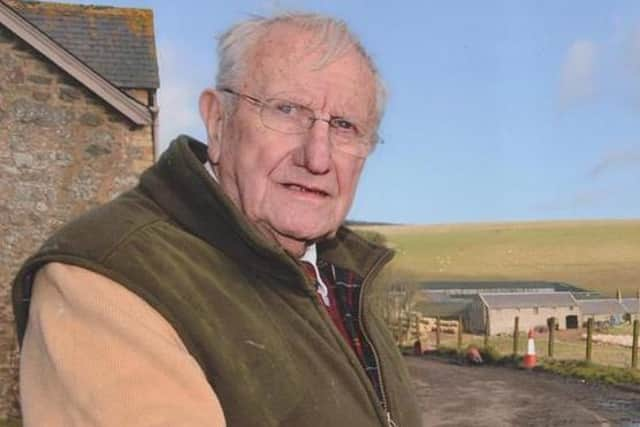Scotsman Obituaries: Prof William Penny CBE, black box innovator


As a teenager leaving school during the Second World War William Penny started work as a junior at the research facility Aeroplane and Armament Experimental Establishment at Boscombe Down in Wiltshire.
It was 1943, a tumultuous year in the conflict, with the Germans surrendering at Stalingrad and the Italians capitulating to the Allies seven months later.
Advertisement
Hide AdAdvertisement
Hide AdAnd Boscombe Down, a regional control centre for Britain’s Bomber Command, fulfilled various roles in the war effort, including testing armaments, hosting trials for new aircraft and developing improvements in aircraft equipment.
Penny worked in a team developing instruments for the performance testing of aircraft, measuring air turbulence, humidity, the frost point and icing.
While doing his day job Penny was also studying part-time for professional qualifications in aeronautical and mechanical engineering.
Fast forward more than a decade and the diligent young man had not only co-founded a specialist instrument firm but become instrumental in developing a piece of kit that would revolutionise air accident investigation and contribute enormously to airline safety – the black box.
He would go on to build an enviable international reputation for innovation and be appointed a CBE for services to the industry and to a personal chair in engineering at City, University of London, before settling in the Scottish Borders.
Universally known in later life as “the Prof”, young Penny left Boscombe Down to gain broader experience, first in process control instrumentation and then in aerospace, working at Kelvin Hughes, which developed and manufactured aircraft instruments.
It was there, while an assistant chief engineer, that he met instrument maker Jim Giles, and their partnership would lead to them founding Penny and Giles in 1956.
They soon established themselves in the specialised field of high-precision instruments used in flight-testing of aircraft and had early success in the recording of flight date for use in accident investigation.
Advertisement
Hide AdAdvertisement
Hide AdUp until 1957 it had only been possible to record the pilot’s voice but Penny developed transducers which could also measure air speed, altitude, acceleration and control surface positions, information which could then be recorded magnetically in the “high survival potential” device known as the black box data recorder.
In 1963 the UK Ministry of Aviation decided to make made it mandatory for civil aircraft carrying passengers to be equipped with accident data recording systems and Penny and Giles were perfectly placed to supply the systems’ sensor and recorders.
Over the decades the company developed technologies and products for a diverse range of markets which included professional broadcasting and recording, motor controllers for powered wheelchairs, paperless chart recorders and trackerballs for computer interfacing.
Their success led to the establishments of various autonomous business units and by 1975 the company had become a diversified group of advance technology companies.
At its height the company employed 1,200 members of staff and Penny served as its chairman until 1995, leading by example but focusing on teamwork and collective achievement.
He also worked diligently to promote links between academia and industry, particularly in the engineering faculty at City University where he was awarded two doctorates.
He also served on the advisory committee of Bournemouth Municipal College and later on the board of Bournemouth University, where he was made an Honorary Doctor of Technology in 2010.
Penny, who was a chartered engineer, Fellow of the Royal Aeronautical Society and the Institutes of Mechanical Engineers and Measurement and Control, was made a CBE in 1989.
Advertisement
Hide AdAdvertisement
Hide AdIn 2002 Penny and Giles was acquired by the US-based Curtiss-Wright Corporation but Penny continued as a company consultant and remained a hugely influential figure, guiding and mentoring generations of engineers.
He lived for almost 50 years at Beachern Wood, near Brockenhurst, in the New Forest, but in 1987 he bought Harehead Farm, Cranshaws in Berwickshire and over the years added land at Crichness, Craigswindshiel and Bothwell.
He enjoyed breeding cattle there – Harehead is renowned for its high quality breeding stock with Harehead Luing cattle among the country’s top herds – and was a keen yachtsman, golfer and musician.
He played the clarinet and saxophone and performed in various dance bands, meeting his wife Beryl through one band where she was the pianist.
The couple, who played in their own dance band until well into their eighties, spent a great deal of time in the Borders over the years.
After the deaths of both his wife and daughter Tessa in 2016, Penny, who has two grandchildren, moved to Scotland to live permanently at their northern base.
Obituaries
If you would like to submit an obituary, or have a suggestion for a subject, contact [email protected]
A message from the Editor
Thank you for reading this article. We're more reliant on your support than ever as the shift in consumer habits brought about by coronavirus impacts our advertisers. If you haven't already, please consider supporting our trusted, fact-checked journalism by taking out a digital subscription.
